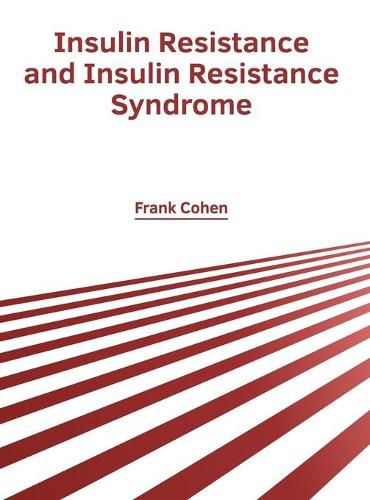Readings Newsletter
Become a Readings Member to make your shopping experience even easier.
Sign in or sign up for free!
You’re not far away from qualifying for FREE standard shipping within Australia
You’ve qualified for FREE standard shipping within Australia
The cart is loading…






This title is printed to order. This book may have been self-published. If so, we cannot guarantee the quality of the content. In the main most books will have gone through the editing process however some may not. We therefore suggest that you be aware of this before ordering this book. If in doubt check either the author or publisher’s details as we are unable to accept any returns unless they are faulty. Please contact us if you have any questions.
Insulin resistance is a set of signs and symptoms that occur due to inhibited insulin activity. It is a subset of a larger group of symptoms called the insulin resistance syndrome. The condition leads to high circulating levels of insulin, and stimulates the formation of new fatty tissues, thus accelerating weight gain and leading to obesity. Insulin resistance is also associated with insulin resistance syndrome or metabolic syndrome. Insulin resistance syndrome refers to an aggregate of five known medical conditions- high blood sugar, central obesity, high blood pressure, high serum triglycerides and low serum high-density lipoprotein. It is generally considered a risk factor for type 2 diabetes and cardiovascular disease. The nature of the development of this syndrome is still an area of active medical research. It often affects older obese adults having a degree of insulin resistance and leading a sedentary life. Whether insulin resistance or obesity triggers metabolic syndrome or if they are consequences of a complex metabolic derangement is a subject of study. Each disorder manifested in metabolic syndrome is treated separately. Hypertension is treated using ACE inhibitors and diuretics, and cholesterol drugs are prescribed to manage abnormal levels of triglycerides and LDL/HDL cholesterol. Restricting the intake of carbohydrate in food is recommended for the management of both insulin resistance and insulin resistance syndrome. The topics included in this book on insulin resistance and insulin resistance syndrome are of utmost significance and bound to provide incredible insights to readers. It presents researches and studies performed by experts across the globe. It will prove to be immensely beneficial to students and researchers.
$9.00 standard shipping within Australia
FREE standard shipping within Australia for orders over $100.00
Express & International shipping calculated at checkout
This title is printed to order. This book may have been self-published. If so, we cannot guarantee the quality of the content. In the main most books will have gone through the editing process however some may not. We therefore suggest that you be aware of this before ordering this book. If in doubt check either the author or publisher’s details as we are unable to accept any returns unless they are faulty. Please contact us if you have any questions.
Insulin resistance is a set of signs and symptoms that occur due to inhibited insulin activity. It is a subset of a larger group of symptoms called the insulin resistance syndrome. The condition leads to high circulating levels of insulin, and stimulates the formation of new fatty tissues, thus accelerating weight gain and leading to obesity. Insulin resistance is also associated with insulin resistance syndrome or metabolic syndrome. Insulin resistance syndrome refers to an aggregate of five known medical conditions- high blood sugar, central obesity, high blood pressure, high serum triglycerides and low serum high-density lipoprotein. It is generally considered a risk factor for type 2 diabetes and cardiovascular disease. The nature of the development of this syndrome is still an area of active medical research. It often affects older obese adults having a degree of insulin resistance and leading a sedentary life. Whether insulin resistance or obesity triggers metabolic syndrome or if they are consequences of a complex metabolic derangement is a subject of study. Each disorder manifested in metabolic syndrome is treated separately. Hypertension is treated using ACE inhibitors and diuretics, and cholesterol drugs are prescribed to manage abnormal levels of triglycerides and LDL/HDL cholesterol. Restricting the intake of carbohydrate in food is recommended for the management of both insulin resistance and insulin resistance syndrome. The topics included in this book on insulin resistance and insulin resistance syndrome are of utmost significance and bound to provide incredible insights to readers. It presents researches and studies performed by experts across the globe. It will prove to be immensely beneficial to students and researchers.